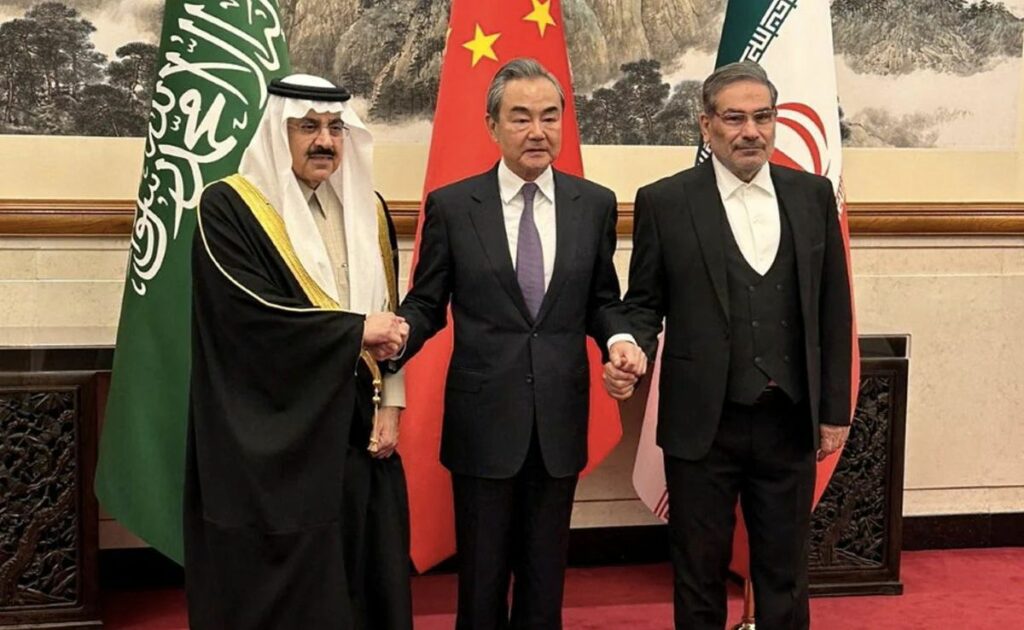Dr Andrew McIntosh – SALAM DHR Director of Research and Studies
The Kingdom of Saudi Arabia and the Islamic Republic of Iran have agreed to resume diplomatic ties following bilateral talks facilitated by the People’s Republic of China acting as a neutral broker. The two countries, often viewed as the two largest geopolitical rivals in the Middle East will re-establish their embassies in Riyadh and Tehran within two months and vowed to respect each other’s “sovereignty and not to interfere in internal affairs.”
However, there are also reasons to be sceptical of the agreement’s ability to bring peace to flashpoints in the regionand to worry about the implications it may have on human rights and democracy in the Kingdom of Bahrain.
Although the decision is being interpreted as cause for celebration by both parties, the promises they’ve made remain vague at this time. Regarding non-interference in internal affairs, it is unclear how this will specifically materialise.Both Riyad and Tehran make considerable use of allies’ forces in third countries. These various groups have agendas of their own and decommissioning them – assuming both sides are willing to do so – may not be possible.
In the case of Bahrain, the matter is further complicated by the country’s geopolitical positioning and status. Ostensibly independent, Bahrain is often regarded as a suzerain of Saudi Arabia, with very close economic and security ties. This, along with a long history of tensions and hostilities between the ruling Al Khalifa family and Iran, have created a shared vision of security in the Gulf between Saudi Arabia and Bahrain.
It remains unclear if Bahrain will alter its relations with Iran like Saudi Arabia has promised, or possibly act as a Saudistate proxy in the region, enabling it to take harsher stances. It could also potentially entice the Government of Bahrain to strengthen its already growing security and diplomatic ties with Israel, whose initial response to the deal has been negative, to counter Iran. A closer relationship with Israel, which has always been unpopular with most Bahrainis, could in turn galvanise opposition and possibly result in crackdowns from security forces.
Bahrain is classified as “unfree” by the pro-democracy think tank Freedom House, and has a record of ongoing human rights abuses, which include arbitrary arrests and detention, torture, and an estimated 1,400 political prisoners under the reasoning that it is defending itself from de-stabilising elements loyal to Iran and Qatar.
With Bahrain-Qatari relations also improving, albeit gradually, adhering to this new paradigm would require a considerable reconstruction of Bahrain’s national and international media narratives, which are designed to justify the island nation having both the highest proportion of policeand prisoners in the Middle East.
Riyadh and Manama are not the only players who mightchange their tactics in this theatre. Iran and Iranian funded media are often the first to mass report human rights abuses in Bahrain, especially on sectarianism against its Shi’a population. Iranian media presents itself as an advocate forShi’a Muslims in the Middle East. Consequently, it’s been in the Iranian state’s interest to cover incidents of sectarianismthoroughly in Bahrain.
Would Iran be willing to curtail or suspend these media networks for the sake of non-interference? If it did, theimplications for human rights reporting in Bahrain on sectarian incidents, as well as the treatment of political prisoners, many of whom are prominent Shi’a clerics, could be adversely affected.
There is the distinct possibility that détente, although possibly beneficial for de-escalating the civil war conflict in Yemen, could represent the worst of both worlds for human rights in Bahrain, where state securitisation proliferates and there are fewer incentives to report on human rights violations caused by it. Despite any criticisms Saudi and Iranian media make against one another, human rights are a non-priority in thisagreement. Both countries are accused for human rights abuses.
The agreement most closely reflects the international stance ofits third party, China. China has consistently prioritised sovereignty over human rights, a position that deflects from the own record of consistent, dire human rights abuses.
A major importer of oil and gas, China’s main priorities in the Middle East are its ability to obtain energy unhindered and to increase its footprint in the region while American influence is perceived to be waning. If the deal proves successful, China will have proven itself to be a successful broker and a new power player that is willing to position itself as a diplomatic,commercial, and ideological alternative to the West. Thiswould have bleak implications for the promotion of human rights and rule of law in Middle East.
Enthusiasm for the agreement may be premature, however. MENA’s recent diplomatic history – most notably the Oslo Accords and the Joint Comprehensive Plan of Action (also known as the Iran nuclear deal) – demonstrates that observers should be cautious about its potential impact.
Détente is not friendship, and the profound mistrust between Tehran and Riyadh that has defined its relations over the past several years is unlikely to abate soon. The steps they’rewilling to take will show whether these actions are in fact amove closer to rapprochement, a pragmatic recalibration of power politics, or are merely “ink on paper” that changes little or nothing on the ground.
In either case, the Government of Bahrain most likely intendsto wait and see, while continuing it’s “business as usual” approach to securitising the right to free speech, press, expression, and assembly, banning political opposition figures from entering politics and refusing to release political prisoners.


 العربية
العربية Français
Français Deutsch
Deutsch